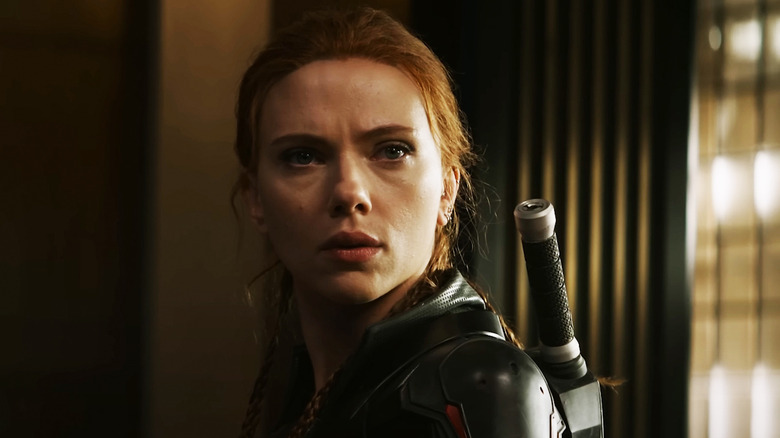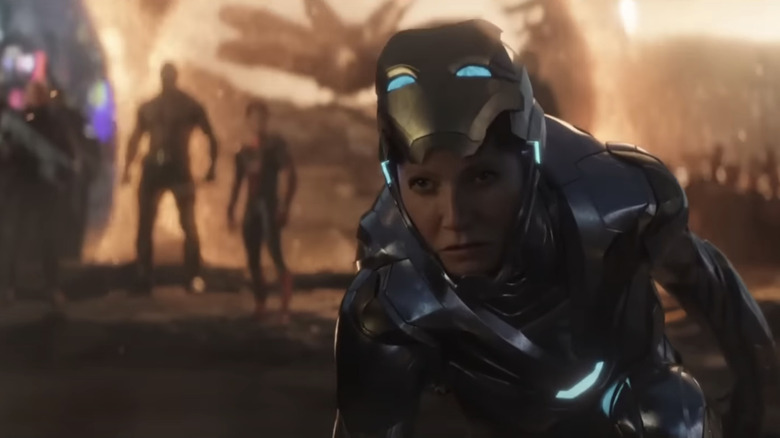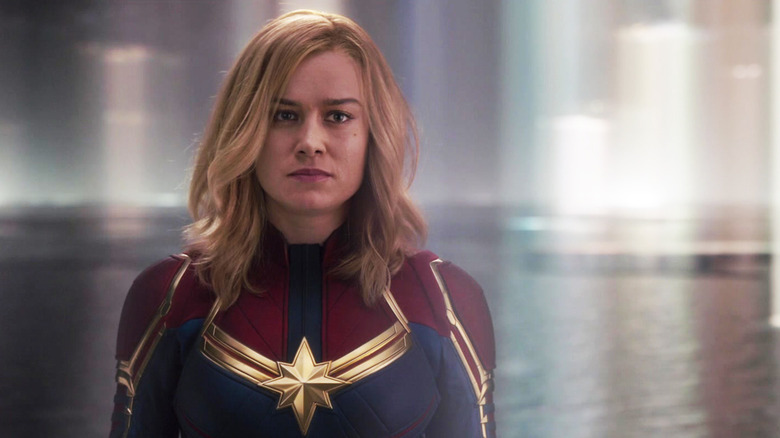The Cinematic Trope Marvel Studios Has Tried To Avoid From Its Very First Movie
For all the accusations of cinematic mundanity levelled at the Marvel Cinematic Universe, the series does have its share of stylistic calling cards. A witty quip, a family-friendly tone, a crowd-pleasing hero arrival just as things are falling apart — it's all part of the recipe that has made Kevin Feige's saga the most successful blockbuster franchise of all time. But there is one particular trope Feige has intentionally avoided: the damsel in distress.
Speaking to Rotten Tomatoes in 2018, the Marvel Studios head explained how he went into the MCU with a well-defined plan to avoid featuring imperiled women in need of rescue. In fact, he went into his career with that aversion already well-established. "From the beginning of my career, the notion of the damsel in distress was outdated," he said. "And when we started to make our own movies, we didn't want to fall into that trope – we wanted to avoid it as much as possible."
You might be racking your brain for moments where MCU movies have seemingly transgressed this fundamental rule. But you'd be hard pressed to point to such a moment, as most of the women in Feige's franchise are bonafide badasses. At least, that's been the general trend for this particular franchise, which has focused more and more on female heroes as it's gone on. Now, I'm not saying the MCU represents some paragon of female empowerment. But female Marvel characters are typically given more to do than motivate male characters.
The MCU has featured more female heroes as its gone on
Back in 2008, "Iron Man" became the unlikely superhero movie that changed Hollywood forever. Though it told the story of Robert Downey Jr.'s Tony Stark, it did feature Gwyneth Paltrow as his assistant and eventual girlfriend Pepper Potts, who rather than being some sort of object for Stark to ogle, represented a strong presence who kept Downey's playboy in line. As the movies went on, Potts would actually suit up and even saved Stark himself on several occasions, representing the series' general trend towards showcasing more female heroes as it evolved.
In his 2018 sit-down with Rotten Tomatoes, Kevin Feige pointed to Hayley Atwell's Agent Margaret "Peggy" Carter, who began as a love interest for Steve Rogers (Chris Evans) in "Captain America: The First Avenger" (2011) but soon became a protagonist in her own right, appearing in "Agents of S.H.I.E.L.D." before fronting her own ABC series for two seasons between 2015 and 2016. "With Agent Carter, she is unbelievably capable at a time when it was very difficult to rise up the ranks in the military," said Feige, referring to the 1940s setting of the series. "We really wanted to create these female characters that were as strong and as capable as the heroes. Now, as we've continued to grow, that's gotten even more apparent, to the point where they are the heroes."
In 2019, "Captain Marvel" debuted and was a commercial and critical hit, making $1.1 billion and maintaining a 79% Rotten Tomatoes score to this day. As Marvel's first female superhero movie, "Captain Marvel" made a solid first landing, suggesting things were only going to improve for the women of the MCU. Feige certainly thought so, pointing to the then-upcoming film as proof of his franchise's tireless efforts to celebrate female heroes. "Literally right this second, Brie Larson is on the set of 'Captain Marvel' in the first few weeks of photography," he said. Unfortunately, Feige might have waited a tad too long to make this shift towards female heroes as it happened to coincide with a marked drop in quality for the franchise as a whole.
The MCU took too long to showcase female heroes
In his RT interview, Kevin Feige also highlighted Ryan Coogler's "Black Panther" and its female characters, Okoye (Danai Gurira), Nakia (Lupita Nyong'o), and Shuri (Letitia Wright). "They're already iconic characters," said the Marvel boss, "and people are already asking, 'When are they getting their movies? When are we getting the Shuri movie?' The answer is: Nobody wants to see that more than me. And that's a testament to that film and to those actresses. And to the world being ready, and overdue, to see these types of characters on the screen."
In the years since Feige's interview, we have indeed seen Shuri take on the mantle of Black Panther in 2022's "Black Panther: Wakanda Forever," which was one of the more successful female-led projects to come out of the MCU of late. Otherwise, much of this project to highlight female characters has come as the MCU has entered a fraught and tumultuous phase in which many fans have tuned out amid a deluge of middling streaming series and bland, generic blockbusters.
Aside from the cosmic disappointment that was 2023's "The Marvels," there's "She-Hulk," a messy, meta legal sitcom which mostly missed the mark, and the big disappointment that was "Black Widow." But there have also been some big wins in the form of "WandaVision" and 2025's "Thunderbolts," which was the best MCU movie in a long time and featured Florence Pugh's Yelena Belova as the lead. Sadly, "Thunderbolts" underwhelmed at the box office, but that certainly wasn't due to the film featuring a female hero. All of which is to say that by the time women really came to the fore in the MCU, the franchise was suffering from more general problems which somewhat hampered their rise. Let's hope the upcoming "Avengers" movies can rectify things and give women a proper launching pad unhindered by the issues that have plagued the MCU of late.


